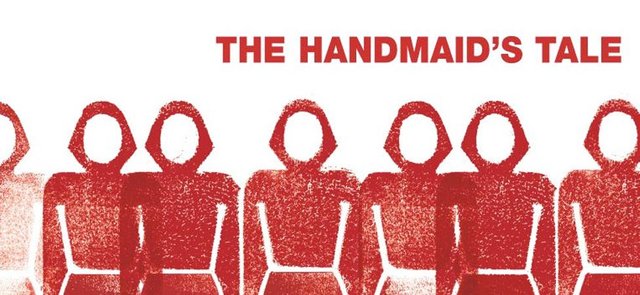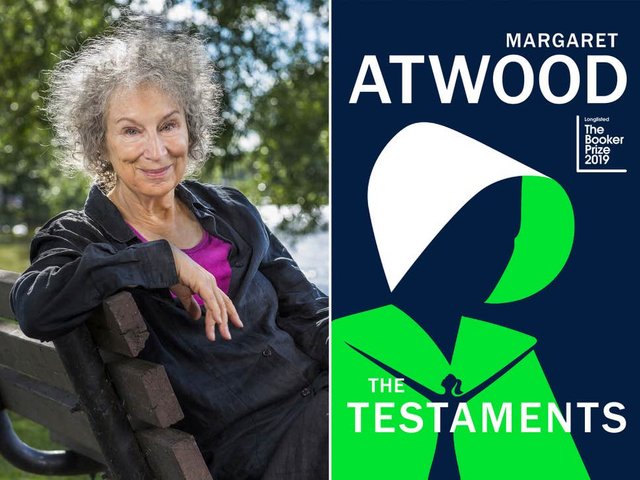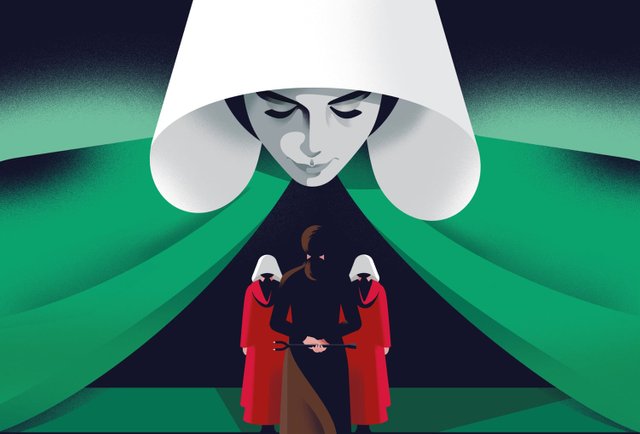Perfect timing about ”The Testaments” Margaret Atwood.
Apparently, a good book is recognized by the fact that it changes with the reader. Coming back to it every few years, we find something different every time. We are already different, we have a new baggage of experience, but in such a book we still find answers to new questions or, equally often, new unanswered questions. This is what happens to me with The Handmaid's Tale. I read it for the first time in college and was shocked by the vision of a world in which women have no rights. The scene in which women point out the victim of mass rape, their friend, and shout that it was "her fault", was in my head forever. Atwood wrote her great novel so that we had the impression that theoretically such a development of history is possible, but reading it for the first time I was relieved that humanity went the other way.
The world has changed a lot since then. Again, I reached for The Handmaid's Tale - I wanted to watch the series, however, first remembering the book, and above all I planned to read The Testaments, a sequel, written by Atwood after 34 years. Atwood wrote The Testaments thinking of increasingly right-wing America. Reaching for the second time for The Handmaid's Tale, I felt a cold shiver and choking in my throat. After all, I can't be sure that history will not suddenly turn into an equally frightening side. In addition, I am now a mother, so the story of a woman whom they pick up their daughter because, as a woman, she loses the right to everything, including her children, sounded different in me.
It seems to me that writing the sequel required a lot of courage from the author. After all, she completed one of her great works. In addition, the strength of The Handmaid’s Tale lies in intimacy and understatement. Freda's story is set in four walls, in her room, in the Commandant's house, sometimes only elsewhere. Gilead is full of secrets, we do not understand how it works, who the Eyes are, who they report, who holds power. The end of the book leaves us with questions that we can try to answer, but we will never be sure that we are right. In this way, our attention is focused on what is important and not on the circumstances. We follow the heroine so closely that we identify with her. We become Freda, raped by the Commander in the lap of his wife. Freda, whose bank account one day just stops working, Freda, who once had a daughter. We don't need to know who the Eyes are to feel horrified, not knowing if they are just looking.
At the same time, we wanted to know, because it's ours, readers, nature. We wanted to know how and when Gilead would fall, because the fact that it would fall, the author told us at the end. We wanted to know what happened to Freda and her child. And the author decided that she would reveal some secrets to us. And unfortunately, although The Testaments reads great, this book does not have the firepower it had and still has The Handmaid's Tale.
The Testaments is both a sequel and a prequel. The action begins about fifteen years after the events of the first novel, but some of the scenes take place in the first days of Gilead, when the regime was just forming. Instead of one narrator, we have three. The first and definitely the most interesting is Aunt Lydia, one of the women who joined the torturers. In The Testaments we will find out who she was in the past and how it happened that she became one of the cruel Handmaid’s Trainers. The other two narrators are young girls - Agnes, who grew up in Gilead and just entered the age at which she should get married, and Daisy, a somewhat lonely and rebellious teenager from Canada. Their stories, of course, intertwine, very neat and interesting. And although we quickly guess a few things the author kept secret initially, reading the historical commentary that ends this book, just like in the Handmaid's Ending, ends us a bit with complacency. Because can we believe our guesses? Are we not fooled by false clues and the need to close the story?
Agnes and Daisy are also less interesting narrators. Fred's fate was closer to me because she lived before Gilead and knew the difference. She knew what sex could be, she remembered life with the man she loved. Enslaved, reduced to the role of a breeding cow, she kept her dignity because she did not lose hope that she would regain the old world. She clung to the first opportunity for a relationship with another human being. Agnes, however, was raised in Gilead, she is deeply religious, she doesn't know because she can't know what her life would look like. We watch her with interest, we care about what may happen to her in marriage, but we do not feel her. Daisy, as she doesn't know the world or even the truth about herself, is equally interesting and equally alien. We get to know them, we start to like them, but we do not enter their skin. Paradoxically, Lydia seems to be closest to us, as we observe the beginning of her career as Aunt. We know that she made the choice herself, but we also understand what led her to it.
The Testaments answers many questions. We learn a lot about functioning and weaknesses of Gilead. We get to know those who pull the strings, sometimes openly and sometimes out of hiding. Knowing who leaders really are, what they are doing, can change everything. Atwood writes about false news, pretense, hypocrisy, and Gilead begins to seem frighteningly real again. Only spreading the truth can overthrow the regime.
So although this is not the best Atwood novel, it is good, poignant and (unfortunately) much more timely than The Handmaid's Tale in 1985.


